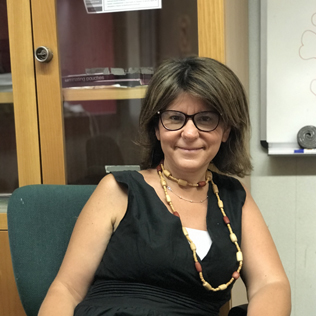BBE-Biotecnologie Biochimiche ed Enzimologia

Room 2N-38/39; phone +39-081-2539473, Email: raffaele.porta@unina.it;

Prof. Loredana Mariniello
Room 2N-37; phone +39-0812539470, Email: loredana.mariniello@unina.it;

Prof. Prospero Di Pierro
Room 2N-34; phone +39-081674287, Email: prospero.dipierro@unina.it;

Dott.ssa C. Valeria L. Giosafatto
Room 2N-36; phone +39-0812539470, Email: giosafat@unina.it;
Other Group members:
PhD students: Asmaa Al-Asmar (XXXII ciclo); Manar Abdalrazeq ((XXXIII ciclo); Fatemeh Mirpour (XXXIV ciclo)
Group web sites:
http://www.transglutaminase-what.org/
Research:
Use of transglutaminase as biotechnological tool
Production and characterization of bioplastics
Use of transglutaminase as biotechnological tool
Transglutaminases (TGases; 2.3.2.13) are a family of enzymes able to catalyze the formation of isopeptide bonds between endoprotein gamma-carboxamide groups of glutamine residues and epsilon-amino groups of lysine residues, giving rise to linear or branched protein homo- and heteropolymers. TGases, and in particular microbial molecular form of the enzyme (mTGase) exhibiting peculiar characteristics (resistance, not cation-dependency, wide range of optimal pH), can be utilized as an effective tool in vitro to modify the structure and function of both peptides and proteins able to act as acyl donor and/or acceptor substrates for the enzyme. We carry out purification and immobilization studies of the enzyme and researches devoted to find out new TGase substrates either from animal and plant tissue to modify their biological properties, such as their antimicrobial activity, their allergenicity and digestibility.
Main collaboration:
Prof. Alan Mackie, School of Food Science & Nutrition, University of Leeds, UK
Prof. Mingsheng Dong, College of Food Science and Technology, Nanjing, Agricultural University, China
Prof. Neila Trifi-Farah, Faculté des Sciences de Tunis
Prof. Renata Piccoli, Dpt of Chemical Sciences, University of Naples Federico II

Production and characterization of bioplastics
Bioplastics are an attractive eco-friendly alternative since they can be easily degraded by the enzymes present in different microorganisms. In particular, we produce hydrocolloid bioplastics by using unexpansive raw materials originating from agro-industrial wastes. These materials are made of natural biopolymers (polysaccharides, protein and their derivatives) with peculiar characteristics of mechanical resistance and gas permeability. To improve their functional properties, the enzyme transglutaminase of microbial origin has been successfully exploited by our group during the last 15 years. In order to further strengthen the hydrocolloid film matrix, we also use different plasticizers, such as glycerol or polyamines, able to improve the technological features of the films. They are also reinforced with nanoparticles and/or blended with other hydrophobic polymers. Finally, the obtained bioplastics are exploited as carriers of active molecules for their possible application to improve the food preservation.
Main collaboration:
Prof. Giovanni Sannia, Dpt of Chemical Sciences, University of Naples Federico II
Prof Andreas Blennow, Dpt of Plant and Environmental Sciences, University of Copenhagen (Denmark)
Prof. Reynaldo Villalonga, Facultad de Ciencias Químicas, Complutense University of Madrid (Spain)
Prof. Carlos Regalado-Gonzales, Departamento de Investigación y Posgrado, Facultad de Química, Universidad Autónoma de Querétaro (Mexico)
Prof. Mahdi Kadivar, Department of Food Science, College of Agriculture, Isfahan University of Technology (Iran)
